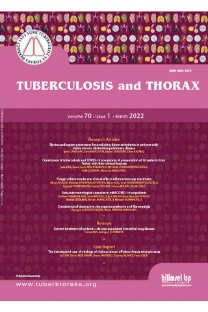Hekimlerin, hasta yakınlarının ve toplumun akciğer kanseri tanısının söylenmesine ilişkin görüşlerinin değerlendirilmesi
Evaluation of physians, patients, relatives and society of opinions on the told lung cancer diagnosis
___
- 1. Ferlay J, Shin HR, Bray F, Forman D, Mathers C, Parkin DM. Estimates of worldwide burden of cancer in 2008: GLOBOCAN 2008. Int J Cancer 2010;127:2893-917.
- 2. Göksel T, Akkoclu A; Turkish Thoracic Society, Lung and Pleural Malignancies Study Group. Pattern of lung cancer in Turkey, 1994-1998. Respiration 2002;69:207-10.
- 3. Jett JR, Midthun D. Screening for lung cancer: current status and future directions: Thomas A. Neff lecture. Chest 2004;125(Suppl 5): S158-62.
- 4. Özkan S. Psikiyatrik ve psikososyal açıdan kanser konsültasyon liyezon psikiyatrisi kongre kitabı 1998-1999. İstanbul:140-53.
- 5. Espinosa E, Gonzalez BM, Zomora P, Ordonez A, Arranz P. Doctors also suffer when giving bad news to cancer patients. Support Care Cancer 1996;4:61-3.
- 6. Ozdogan M, Samur M, Bozcuk HS, Coban E, Artac M, Savas B, et al. "Do not tell": what factors affect relatives' attitudes to honest disclosure of diagnosis to cancer patients? Support Care Cancer 2004;12:497-502.
- 7. Benson J, Britten N. Respecting the autonomy of cancer patients when talking with their families: qualitative analysis of semistructured interviews with patients. BMJ 1996;313:729-31.
- 8. Surbone A. Telling the truth to patients with cancer: what is the truth? Lancet Oncol 2006;7:944-50.
- 9. Oksuzoglu B, Abali H, Bakar M, Yıldrım N, Zengin N. Disclosure of cancer diagnosis to patients and their relatives in turkey: views of accompanying persons and influential factors in reaching those views. Tumori 2006;92:62-6.
- 10. Uçar N, Aksu F, Alpar S, Güven S, Örsel O, Kurt B. Akciğer kanseri tanısı hastaya söylenmeli mi? (Anket Çalışması). Solunum Hastalıkları 2007;18:148-56.
- 11. Faridhosseini F, Ardestani MS, Shirkhani F. Disclosure of cancer diagnosis: what Iranian patients do prefer? Ann Gen Psychiatry 2010;9(Suppl 1):S165.
- 12. Vahdaninia M, Montazeri A. Cancer patient education in Iran: attitudes of health professionals. Payesh 2003;2:259- 65.
- 13. Hoff L, Tidefelt U, Thaning L, Hermeren G. In the shadow of bad news-views of patients with acute leukaemia, myeloma or lung cancer about information, from diagnosis to cure or death. BMC Palliat Care 2007;6:1.
- 14. Wood WA, McCabe MS, Goldberg RM. Commentary: disclosure in oncology-to whom does the truth belong? Oncologist 2009;14:77-82.
- 15. Ruhnke GW, Wilson SR, Akamatsu T, Kinoue T, Takashima Y, Goldstein MK, et al. Ethical decision making and patient autonomy: a comparison of physicians and patients in Japan and the United States. Chest 2000;118:1172-82.
- 16. Hamadeh GN, Adib SM. Cancer truth disclosure by Lebanese doctors. Soc Sci Med 1998;47:1289-94.
- 17. Numico G, Anfossi M, Bertelli G, Russi E, Gento G, Silvestris N, et al. The process of truth disclosure: An assessment of the results of information during the diagnostic phase in patients with cancer. Ann Oncol 2009;20:941-5.
- 18. Noore I, Crowe M, Pilley I. Telling the truth about cancer: views of elderly patients and their relatives. Ir Med J 2000;93;104-5.
- 19. Doruk S, Sevinç C, Sever F, İtil O, Akkoçlu A, The trends of relevance about telling lung cancer diagnosis: social constraints, medical pratice in Several Clinics. Tuberk Toraks 2012;60:336-43
- ISSN: 0494-1373
- Yayın Aralığı: Yılda 4 Sayı
- Başlangıç: 1951
- Yayıncı: Tuba Yıldırım
Hemoptysis in a serum ANCA-positive elderly patient
Hiroaki SATOH, Hiroko WATANABE, Tomohiro TAMURA
Geçmeyen öksürüğe neden olan tüberküloza bağlı bronkoözefageal fistül
Ali Fuat KALYONCU, Cemal CİNGİ, Iogana AGACHE, Claus BACHERT, George Walter CANONICA, Thomas CASALE, Alvaro CRUZ, Wytsk Ej FOKKENS, Peter HELLINGS, Bilun GEMİCİOĞLU, Ömer KALAYCI, Jean BOUSQUET, Ayşe Arzu YORGANCIOĞLU, Anna BEDBROOK
Hikmet Tekin NACAROĞLU, Mustafa Yavuz KÖKER, Demet CAN, Ferah GENEL, Nesrin GÜLEZ, Semiha ERDEM BAHÇECİ, Canan Şule KARKINER ÜNSAL, İlker DEVRİM
Ayşe Arzu YORGANCIOĞLU, Tuğba GÖKTALAY, Ayşın COŞKUN ŞAKAR, Yavuz HAVLUCU, Utku DATLI, Pınar ÇELİK
Funda DEMİRAĞ, Yurdanur ERDOĞAN, Yeliz DADALI, Saliha YILMAZ, Burcu CİRİT KOÇER, Sertaç ÖZDEN BÜYÜKYAYLACI, Berna ÖZYÜREK AKINCI
Özgür ÖNAL, Deniz ŞAHİN SAY, Yalçın KANBAY, Sonnur YAZICI, Dilek ÇAKMAKÇI KARADOĞAN
Mohammad HOSSEİN, Shaghayegh RAHIMIRAD, Mohammad REZA, Farid RASHIDI, Mohammad Hossein RAHIMIRAD
